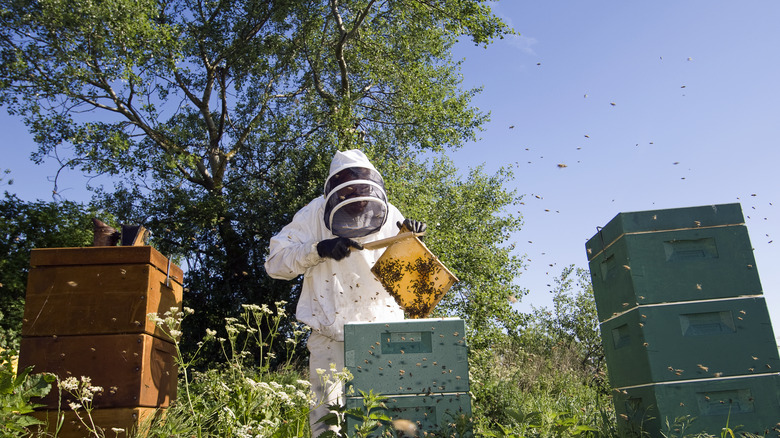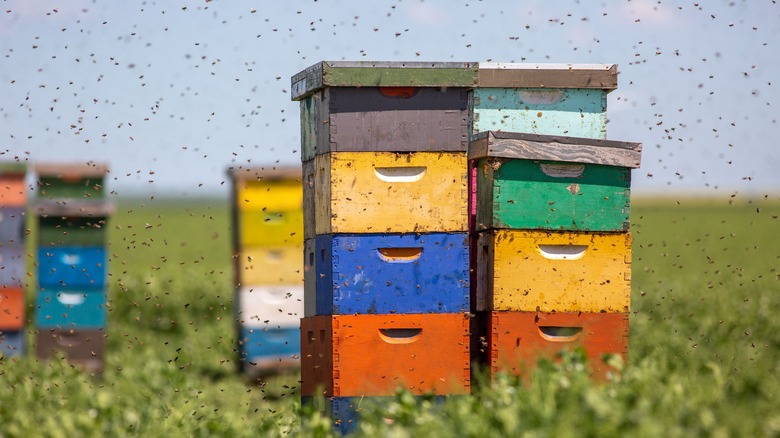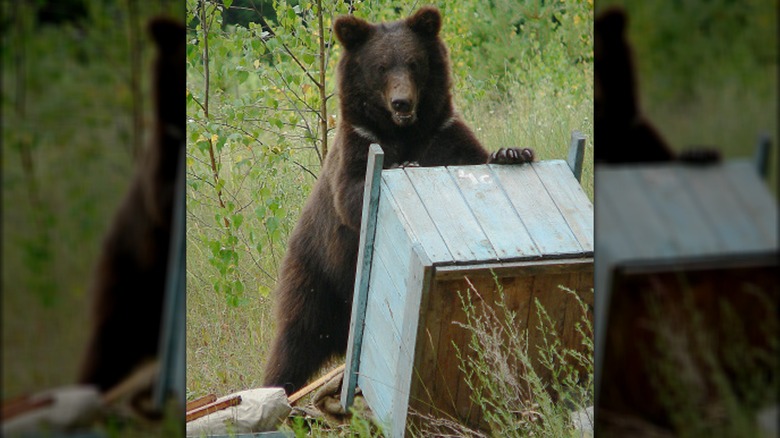Beekeeping 101: How To Prevent Bears From Ruining Your Beehives
The pop culture image of a bear being unable to resist honey is embedded in the minds of many, even those who have never seen a bear in the wild. In actuality, it is not far from the truth, as honey ranks high on the list of preferred meals for American black bears. However, it is more than just honey that attracts bears to beehives. While they do, indeed, eat the honey, they also eat the honey makers, consuming bees, bee larvae, and the honeycomb. Although bears will forage beehives in the wild, they certainly are not against raiding the hives and boxes of beekeepers, either. Often times when they do, they destroy the entire operation, smashing the boxes and frames and consuming the bees and larvae along with the honey.
For those who maintain beehives in bear country, this behavior adds yet another reason to bear-proof homes in order to protect their property, including beehives from these dangerous bears. To that end, if you are in or near bear country, Beekeeping 101 is how to prevent bears from ruining your beehives.
Pick the proper place for your hives and harvest honey regularly
The first step to keeping your beehives safe from bears is to pick the proper location. As a rule of thumb, the further from the tree line the better. According to the Maine Department of Inland Fisheries and Wildlife, bee hives placed within 300 feet of the treeline are twice as likely to be targeted by bears. Therefore, it is recommended to place hives at least that far from the treeline whenever possible, as the treeline affords cover for bears looking to raid hives. To that end, it is also recommended to keep grass and shrubs trimmed around the hives. Additionally, be sure to place hives away from any other potential food source for bears such as bird feeders, berry patches, or fruit trees.
Of course, regardless of where they are positioned, the scent of honey will eventually reach the noses of nearby bears. With that in mind, it is important to harvest honey regularly. The longer the honey remains in the hive, the more of the aroma bears find irresistible is released. This is particularly important during spring and fall when bears are most likely to raid hives. In order to limit scent attractants as much as possible, it is also necessary to clean up any wax, dead bees, or debris from the hive.
Put up barriers to protect beehives from bears
When it comes to securing beehives from bears, it basically boils down to making them inaccessible. That can partially be accomplished by the placement. Putting barriers, such as fences, around the beehives will add an extra layer of protection. While any fence will help deter bears, electric fences are recommended for keeping beehives safe in bear country. Additionally, while single-strand electric fences are suitable for keeping out livestock such as cattle and pigs, a multi-strand fence that reaches from inches above the ground upwards at least three feet is suggested. The fence should be set to deliver at least 5,000 volts to be effective against bears.
While most beehives are out in the open, they can also be placed in solid buildings such as metal or wood storage sheds. The solid walls of these structures provide a protective barrier layer. Coupled with an outer fence, they are next to foolproof against bear attacks. Another method to help deter bears is to set up motion-controlled devices such as flashing lights and noise makers that will go on once they detect motion from a bear or other animal. These can be mounted on fence posts if there is no building being utilized to house the hives.


